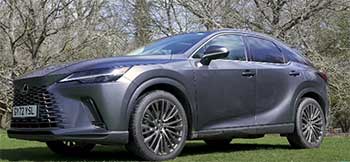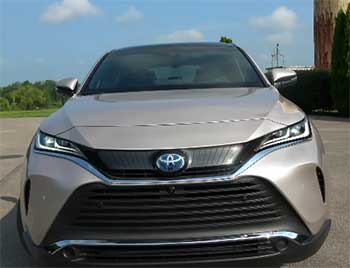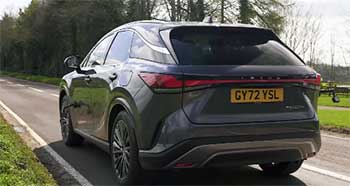I’ve always been drawn to SUVs that balance style, comfort, and performance. I was particularly interested in the Lexus RX and the Toyota Venza. My goal is to help you decide which of these vehicles suits your lifestyle.
Through my test drives and research, I’ll break down their features. I will weigh their strengths and weaknesses. I want to share a real-world perspective to guide your choice. Let’s explore what makes these SUVs tick.
Comparison Table of Lexus RX vs. Toyota Venza
| Feature | Lexus RX | Toyota Venza |
| Starting MSRP | $50,475 | $36,520 |
| Powertrain Options | Gas (2.4L Turbo, 275 hp), Hybrid (246 hp), Plug-in Hybrid (304 hp) | Hybrid only (2.5L, 219 hp) |
| Fuel Economy (Combined) | 22-36 MPG (varies by powertrain) | 39 MPG |
| Cargo Space (Seats Up/Down) | 16.0/32.6 cu ft | 28.8/55.1 cu ft |
| Seating Capacity | 5 | 5 |
| Interior Materials | NuLuxe or leather | Fabric or SofTex |
| Infotainment Display | 9.8-inch or 14-inch touchscreen | 8-inch or 12.3-inch touchscreen |
| Safety Suite | Lexus Safety System+ 3.0 | Toyota Safety Sense 2.5+ |
| Standard Audio | 9-speaker (optional Mark Levinson 21-speaker) | 6-speaker (optional JBL 9-speaker) |
| Warranty (Comprehensive) | 48 months/80,000 km | 36 months/60,000 km |
| User Rating (TrueCar) | 4.81/5 | 4.84/5 |
My Journey with Midsize SUVs
I’ve always had a soft spot for midsize SUVs. They’re the Goldilocks of the automotive world—not too big, not too small, just right for families, road trips, or even a solo commute with a touch of swagger. Over the years, I’ve driven everything from rugged off-roaders to plush luxury crossovers, and I’ve come to appreciate how brands like Toyota and Lexus carve out distinct niches.
The Toyota Venza, with its hybrid-only approach, feels like a practical friend who’s always ready to save you a buck at the pump. The Lexus RX, on the other hand, is like that sophisticated cousin who shows up dressed to impress. Comparing these two is personal for me because I’ve been in your shoes, weighing value against luxury, and I know how tough that choice can be. Let’s break it down from my perspective, having spent time with both vehicles, to see which one might fit your driveway.
Lexus RX Overview
When I first slid into the driver’s seat of the 2024 Lexus RX, I felt like I’d stepped into a living room on wheels. The cabin exudes refinement. It has soft NuLuxe synthetic leather as standard, and the option for perforated leather or semi-aniline leather on higher trims.

The base RX 350’s 2.4-liter turbocharged four-cylinder engine pumps out 275 horsepower. This gives it a lively kick for merging onto highways.
For those chasing efficiency, the RX 350h hybrid delivers 246 horsepower with up to 36 MPG combined. The plug-in hybrid RX 450h+ offers 304 horsepower and an electric range of about 37 miles.
The RX’s tech is a standout. The standard 9.8-inch touchscreen is crisp. However, the available 14-inch display feels like a tablet from the future. Features like the Mark Levinson 21-speaker audio system (optional) and a 10-inch head-up display make every drive feel like an event.
Safety-wise, Lexus Safety System+ 3.0 includes advanced features. These include intersection support for the pre-collision system, lane departure alert with steering assist, and road sign assist. The ride is smooth, almost serene. The all-wheel-drive system handles winter roads with confidence, as I discovered during a snowy test drive in Colorado.
But it’s not perfect. The RX’s cargo space—16.0 cubic feet behind the second row—is tight for a midsize SUV. The base model’s fuel economy (22 MPG city/29 MPG highway) isn’t stellar for a non-hybrid. It also recommends premium gas, which stung my wallet. Still, the RX feels like a premium experience, from its sculpted exterior to its whisper-quiet cabin.
Toyota Venza Overview
The 2024 Toyota Venza, by contrast, greeted me with a different vibe—approachable, efficient, and a bit quirky. It’s hybrid-only, pairing a 2.5-liter four-cylinder engine with electric motors for a combined 219 horsepower. With 39 MPG combined, it’s a champ at sipping fuel. I appreciated this during a week of mixed city and highway driving.

The Venza’s exterior is sleek. It has a sloping roofline and sharp LED taillights that give it a modern edge, almost like a budget Lexus. Inside, the Venza keeps things practical.
The base model has fabric seats, but higher trims offer SofTex synthetic leather. This feels decent but lacks the RX’s polish.
The standard 8-inch touchscreen is functional. The optional 12.3-inch display is impressive for a Toyota, with split-screen functionality that I found handy for navigation and music.
The Venza’s cargo space is a big win—28.8 cubic feet behind the seats, expanding to 55.1 cubic feet with them folded. This makes it a better choice for hauling groceries or sports gear.
Toyota Safety Sense 2.5+ matches many of the RX’s safety features. These include pre-collision with pedestrian detection and lane departure alert. However, it lacks the intersection support of the Lexus system. The Venza’s electric all-wheel-drive system, powered by a rear motor, held its own during light rain. But I noticed more tire spin than with the RX’s mechanical AWD. Starting at $36,520, the Venza is a value play. However, its touch-sensitive controls for volume and climate annoyed me after a few days.
Pros of Lexus RX
- Luxury Interior: The RX’s cabin feels like a step above. It has premium materials like NuLuxe or leather and real wood accents. It’s the kind of place you want to linger in.
- Powertrain Variety: With gas, hybrid, and plug-in hybrid options, you’ve got choices to match your driving style. These range from the punchy 275-hp turbo to the efficient 304-hp PHEV.
- Advanced Tech: The optional 14-inch touchscreen and Mark Levinson audio system are top-tier. The head-up display makes driving feel futuristic.
- Refined Ride: The RX glides over bumps. It keeps road noise to a minimum, making long drives a pleasure.
- Safety Suite: Lexus Safety System+ 3.0 adds cutting-edge features like intersection support. This gives me extra peace of mind in tricky traffic.
- Resale Value: Lexus consistently ranks high for resale value. I confirmed this through Kelley Blue Book’s 2023 Best Luxury Brand award.
Cons of Lexus RX
- Pricey Starting Point: At $50,475, the RX is nearly $14,000 more than the Venza. Options can push it well over $60,000.
- Limited Cargo Space: With just 16.0 cubic feet behind the seats, I struggled to fit larger items compared to the Venza.
- Fuel Economy on Gas Models: The base RX 350’s 22 MPG city isn’t great. It also recommends premium gas, which stung my wallet.
- Complex Infotainment: The large touchscreen looks slick. However, navigating menus took me longer than expected, especially compared to simpler systems.
Pros of Toyota Venza
- Fuel Efficiency: The hybrid-only Venza’s 39 MPG combined saved me noticeable cash during a week of driving, especially in stop-and-go traffic.
- Affordable Price: Starting at $36,520, it’s a steal for a hybrid SUV with this level of tech and comfort.
- Spacious Cargo Area: With 28.8 cubic feet behind the seats, I easily stowed camping gear and groceries without folding the seats.
- Unique Features: The optional Star Gaze panoramic roof, which shifts from opaque to clear, wowed me and my passengers on a night drive.
- Reliable Warranty: Toyota’s 8-year/100,000-mile hybrid component warranty gave me confidence in long-term ownership.
- Family-Friendly: The Venza’s back seat is roomy enough for kids and car seats. Its door handles my nieces could reach easily.
Cons of Toyota Venza
- Limited Powertrain: The single 219-hp hybrid option feels adequate but lacks the RX’s pep, especially on steep inclines.
- Interior Quality: The SofTex seats and plastic-heavy dash don’t match the RX’s upscale vibe. They feel more utilitarian.
- Touch Controls: The touch-sensitive buttons for volume and climate were a hassle. They often required multiple presses to adjust.
- Less Refined Ride: The Venza’s suspension handles bumps well. However, I noticed more road and tire noise than in the RX.
- Traction Issues: The electric AWD struggled slightly in wet conditions. I observed occasional tire spin before traction control kicked in.
Performance and Driving Experience
Behind the wheel, the Lexus RX feels like a performance artist. The base 2.4-liter turbo engine delivers 275 horsepower with a smooth eight-speed automatic. This makes merges and passing effortless. I took an RX 350 through winding mountain roads. Its responsive steering and composed handling kept me grinning.

The hybrid and plug-in hybrid models trade some of that zest for efficiency. However, the PHEV’s 304 horsepower is a sweet spot for power and economy. The RX’s mechanical AWD system dug into snowy roads with authority. This gave me confidence in slick conditions.
The Venza, meanwhile, is more like a reliable commuter. Its 219-horsepower hybrid powertrain, paired with a CVT, prioritizes efficiency over excitement. It’s smooth in city driving. However, I noticed a slight lag when pushing the accelerator on highway ramps.
The CVT’s tendency to hold high revs under hard acceleration created a “sewing machine” hum. This wasn’t my favorite soundtrack. The electric AWD is fine for light rain or snow. But I felt less planted than in the RX during a wet test drive. Still, the Venza’s fuel economy—39 MPG combined—made every gas station visit a small victory.
Interior Comfort and Quality
Stepping into the RX is like entering a luxury hotel lobby. The seats, whether NuLuxe or leather, are plush and supportive. They have 8-way (or optional 10-way) power adjustments. The dashboard’s clean design, accented by wood or carbon fiber, feels premium. The optional heated and ventilated seats kept me comfortable on long drives.
The multi-zone climate control let me and my passengers set our ideal temps. The quiet cabin made conversations easy, even at highway speeds.
The Venza’s interior is cozy but less opulent. The SofTex seats are decent, but the fabric base trim feels basic. The center console is a practical highlight. It has clever storage and sliding cupholders that I loved for organizing odds and ends. However, the touch-sensitive controls for climate and audio frustrated me. They are sleek but finicky.
The Venza’s cabin is roomier for rear passengers, with slightly more legroom for kids or adults. But it lacks the RX’s refined ambiance. Road noise was also more noticeable, especially on rough pavement.
Read More: Hyundai Palisade vs. Kia Telluride vs. Toyota Highlander
Technology and Features
The RX’s tech suite is a showstopper. The 14-inch touchscreen (optional) is vibrant and responsive. However, its menu system took some getting used to. The Mark Levinson audio system turned my test drive into a concert. It had crystal-clear sound that made my Spotify playlist shine.
The head-up display projected speed and navigation right in my line of sight. This is a feature I missed when switching to the Venza. Wireless Apple CarPlay and Android Auto are standard. The Lexus Interface system feels modern, if a bit complex.
The Venza counters with a solid tech package for the price. The 12.3-inch touchscreen on higher trims is nearly as impressive as the RX’s. It has split-screen functionality that let me monitor navigation and media simultaneously. The standard 6-speaker audio is fine. However, the optional JBL 9-speaker system didn’t match the RX’s Mark Levinson for clarity.
The Venza’s Star Gaze roof was a unique touch. It allowed me to toggle between opaque and clear for stargazing or shade. Both SUVs offer wireless smartphone integration. However, the Venza’s interface felt more intuitive for quick adjustments.
Safety and Reliability
Both vehicles are safety superstars, but the RX edges out slightly. Lexus Safety System+ 3.0 includes advanced features like intersection support and proactive driving assist. This gently adjusts steering to avoid obstacles. The RX’s 5-star NHTSA rating, with 4 stars for frontal crash and rollover, gave me confidence.
Toyota Safety Sense 2.5+ on the Venza is nearly as robust. It has pre-collision with pedestrian detection, lane departure, and road sign assist. However, it lacks the RX’s extra layer of tech. Both have eight airbags. However, the RX’s blind spot monitor and parking assist are standard, while the Venza requires higher trims for these.
Reliability is a strong suit for both. Toyota and Lexus consistently top J.D. Power’s dependability rankings. The RX’s 2023 J.D. Power Vehicle Dependability Study win and Kelley Blue Book’s Most Trusted Luxury Brand award underscore its longevity. The Venza benefits from Toyota’s hybrid expertise. It has an 8-year/100,000-mile hybrid component warranty. This outshines the RX’s 10-year/150,000-mile hybrid battery coverage. In my experience, both feel built to last. However, the RX’s premium build gave it a slight edge in perceived durability.
Cost and Value
Price is where the Venza shines. Starting at $36,520, it’s a budget-friendly hybrid with impressive features for the cost. Even the top-trim Venza Limited, at around $43,325, undercuts the base RX by thousands. Maintenance is cheaper, too—an oil change at a Toyota dealer costs about $50 versus $100 for Lexus, based on forum insights. The Venza’s fuel savings (39 MPG vs. the RX’s 22-36 MPG) add up. This is especially true with gas prices hovering around $4 per gallon.
The RX, starting at $50,475, demands a premium for its luxury. Options like the Mark Levinson audio or 14-inch touchscreen can push the price past $60,000. This felt steep during my test drives. However, the RX’s resale value is a big plus. Lexus vehicles often retain value better than Toyotas. This could save you money when trading in. If luxury and performance are your priorities, the RX justifies its cost. If value and efficiency are key, the Venza is hard to beat.
Also Read: Lexus IS 350 vs. IS 500
Real-World Driving Impressions
During my week with the RX, I tackled city streets, highways, and a snowy mountain pass. The turbo model’s acceleration was a thrill. The cabin’s quietness made long drives relaxing. The AWD system gripped confidently in snow. The heated seats were a lifesaver. But loading camping gear was a chore due to the small cargo area. I winced at the fuel pump when filling up with premium gas.
The Venza, tested over a similar mix of roads, impressed with its fuel economy and spacious cargo hold. I fit two suitcases and a cooler without folding the seats, a win for weekend trips. The ride was comfortable. However, the engine’s hum under acceleration and occasional tire noise were noticeable. The Star Gaze roof was a hit with friends. But those touch controls tested my patience daily.
Who Should Choose the Lexus RX?
The RX is for you if you crave luxury and versatility. Its premium interior, powerful engine options, and advanced tech make it ideal for those who want a refined driving experience. It’s perfect for professionals, small families, or anyone who values a quiet cabin and top-tier safety. If you’re willing to pay for premium features and don’t need massive cargo space, the RX delivers a near-luxury experience that’s hard to match.
Who Should Choose the Toyota Venza?
The Venza is your pick if value and efficiency are top priorities. Its hybrid powertrain, spacious cargo area, and lower price make it a smart choice for budget-conscious buyers or families needing practicality. It’s great for commuters, eco-minded drivers, or anyone who wants a stylish SUV without breaking the bank. If you can live with a less plush interior and fewer powertrain options, the Venza is a practical gem.
Frequently Asked Questions
No, they’re distinct models. The Venza is a hybrid-only midsize SUV with a focus on efficiency, while the RX offers gas, hybrid, and plug-in hybrid options with a luxury focus
Not quite. The Venza shares some platform components with the Lexus RX, as both are Toyota products, but it’s designed as a Toyota with less premium materials and features.
The Toyota Venza is the closest match due to its midsize SUV design and hybrid option, but the Toyota Highlander also shares similarities with the RX in size and features.
Conclusion
After spending time with both the Lexus RX and Toyota Venza, I’m torn but enlightened. The RX won me over with its luxurious cabin, versatile powertrains, and smooth ride, making it worth the splurge if you crave a premium experience. The Venza, though, stole my practical side with its unbeatable fuel economy, spacious cargo, and lower price tag. Your choice depends on what you value most—luxury or value. Test drive both, feel their vibes, and let your priorities guide you. I’m confident you’ll find the SUV that fits your life perfectly.

